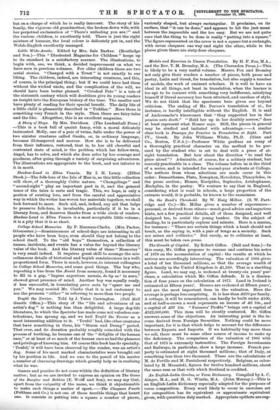The Growth of Capital. By Robert Giffen. (Bell and Sons.)—In
this essay, Mr. Giffen proposes to resume and continue his notes of 1878 on the accumulation of capital : the results at which he arrives are accordingly interesting. The valuation of 1885 gives a total of ten thousand millions, so that the average wealth of each family in the United Kingdom is £1,350. That is a startling figure. Land, we may say, is reckoned at twenty-six years' pur- chase, a calculation which Mr. Giffen defends. It is a diminu- tion of four years on the calculation of 1875. Land in Ireland is estimated at fifteen years'. Houses are reckoned at fifteen years', and are the most important item in the valuation. Here the average is perhaps less surprising. It is less than £270 per family. A cottage, it will be remembered, can hardly be built under £100, and at half-a-crown a week represents an income of £6 10s., and a capital of £97 10s. " Farmers' Profits" brings out a capital of £522,000,000. This item will be stoutly contested. Mr. Giffen answers some of the objections. An interesting point is the in- come derived from Foreign Securities. Nothing could be more important, for it is that which helps to account for the difference between Exports and Imports. If we habitually buy more than we sell, there must be some other source of income to make up the deficiency. The comparison of the valuation of 1885 with that of 1875 is extremely instructive. The Foreign Investments and Railways, in particular, show a large increase. French pro- perty is estimated at eight thousand millions ; that of Italy, at something less than two thousand. These are the calculations of M. de Foville and M. Pantaleoni respectively. Belgium, as calcu- lated by M. Massalski, figures for twelve hundred millions, about the same sum as that with which Scotland is credited.


















































 Previous page
Previous page